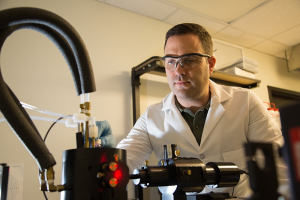The scientist who made the first advancement in the treatment of kidney stones in three decades, Jeffrey Rimer, Ernest J. and Barbara M. Henley Associate Professor of chemical and biomolecular engineering, has been awarded for his work two more times.
The oft-awarded Rimer received the FRI/John G. Kunesh Award from the American Institute of Chemical Engineers (AIChE) in the Separations Division and was given the Netherlands Center for Multiscale Catalytic Energy Conversion (MCEC) Lectureship Award, becoming the inaugural lecturer at three partnering universities in MCEC.
It’s a good pick. He’s got a lot to talk about.
Chemical engineering award
The FRI/John G. Kunesh Award is presented in memory of John G. Kunesh, past Separations Division chairman and technical director of Fractionation Research, Inc. (FRI). One aspect of chemical separations is crystallization, and that’s a field where Rimer shines.
His focus on crystal engineering, which has impacted fields spanning medicine and energy, led him to discover that the extract of a fruit, garcinia cambogia, can dissolve calcium oxalate crystals, the most common component of kidney stones. This potential therapeutic represents the first step forward in kidney stone treatment in 30 years, and is currently being assessed in human and animal trials.
“In our studies we showed that the active component of garcinia cambogia, hydroxycitrate, will inhibit crystal growth by 60 percent,” said Rimer, adding that his lab results pale in comparison to those done by his collaborator Dr. John Asplin at Litholink Corporation, who showed that the molecule reduces calcium oxalate crystal growth in urine by 95 percent.
He’s been at the business of crystals and kidney stones for a while. In 2010 Rimer published a paper in Science magazine on preventing a different kidney stone, L-cystine, using tailored growth inhibitors. His recent discovery of hydroxycitrate as an inhibitor of calcium oxalate crystallization was published in Nature last year.
Rimer’s nomination for the AIChE award is also based on his reputation as one of the leading experts in zeolite synthesis. Notably, Rimer has pioneered the use of high temperature atomic force microscopy (AFM) to study how zeolites grow. He has also developed methods of tailoring properties, such as size and shape, of zeolite crystals. In his work, Rimer uses AFM to track kidney stone and zeolite crystal growth in real time.
“This award honors younger chemical engineers in the area of separations. To be selected by AIChE from a group of people doing excellent work in the chemical engineering community is a significant honor,” said Rimer.
Meanwhile in the Netherlands
At the MCEC, research teams from the fields of chemistry, physics and engineering are jointly addressing sustainable energy, which they call one of the grand challenges faced by society. For their inaugural lectureship program they searched for an emerging leader in the field of catalysis and found themselves at Rimer’s door.
“It’s humbling,” said Rimer. “Especially because this award is based on my body of work in the field of catalysis, which reflects the merit of my research on zeolites and its perceived impact in the field of catalysis.”
Merit he deserves
Rimer is well known for working to understand how catalysts, specifically zeolites, are made and ways to optimize them by controlling their properties.
Though he excels in many fields, he still finds their synthesis remarkable.
“We’ve taken inspiration from methods of controlling natural and pathological crystallization, which we applied to drug development for kidney stones and other diseases, such as malaria,” said Rimer. “We use very similar bio-inspired approaches to control the growth of zeolites. It is interesting how we can bridge completely different fields at a fundamental level.”
He’s won other emerging leadership awards in this field, too.
Rimer gave his lectures at Utrecht University, the University of Twente and Eindhoven University of Technology in May.
